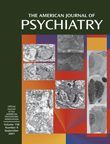Randomized Study of the Dopamine Receptor Agonist Piribedil in the Treatment of Mild Cognitive Impairment
Abstract
OBJECTIVE: Age-related decrease in dopamine D2 receptors is associated with cognitive decline in healthy elderly individuals. This study was an investigation of whether the dopamine receptor agonist piribedil improves global cognitive function in patients with mild cognitive impairment. METHOD: In a 90-day randomized double-blind study, treatment with piribedil was compared to placebo in 60 patients with clinically diagnosed mild cognitive impairment and a Mini-Mental State Examination (MMSE) score of 21 to 25. The primary outcome was change in MMSE score. RESULTS: Of the 30 patients randomly assigned to each treatment group, 19 (63.3%) of those taking piribedil and eight (26.7%) of those treated with placebo had increases in MMSE scores, to 26 or more. The response rate and the mean increase in MMSE scores were significantly greater with piribedil. CONCLUSIONS: Patients with mild cognitive impairment had improvement in global cognitive function when treated with the dopamine receptor agonist piribedil. The results support the role of age-related dopamine decline in cognitive impairment of the elderly.



